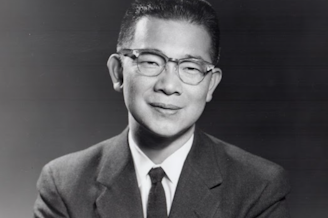## From Ashes to Global Leader: How America Remade the World After WWII
The world held its breath as the final curtain fell on World War II. In its wake, Europe lay in ruins, Japan a shattered landscape, and the global order teetering on the edge of chaos. But from this devastation, a new superpower emerged: the United States.

In his latest book, renowned biographer Walter Isaacson delves into the extraordinary transformation of America in the years following the war – a period that saw it ascend to global dominance, reshape international institutions, and pioneer technological advancements that would define the 20th century.

The United States’ Lasting Impact on the World
Following World War II, the United States emerged as a global leader, shaping the world in profound ways that continue to influence international relations, economies, and cultures today. According to author Walter Isaacson, the U.S. played a pivotal role in creating a new world order, with far-reaching implications for global politics, economies, and societies.
Economic Globalization and the Rise of the Global Economy
The United States was instrumental in establishing the global economic institutions that have shaped international trade and finance for decades. The Bretton Woods system, established in 1944, created the International Monetary Fund (IMF) and the World Bank, which aimed to promote global economic stability and cooperation. The U.S. also played a key role in negotiating the General Agreement on Tariffs and Trade (GATT), a precursor to the World Trade Organization (WTO).
The U.S. leveraged its economic power to promote free trade and globalization, which has had a profound impact on global markets and trade. The rise of multinational corporations and the expansion of international trade have created new opportunities for economic growth and development, but have also led to concerns about income inequality, job displacement, and environmental degradation.
According to Isaacson, “The U.S. was the driving force behind the creation of the global economy, and its economic power has been a major factor in shaping global markets and trade.” The implications of globalization on American workers and industries have been significant, with some sectors experiencing job losses and others benefiting from new opportunities.
The Role of the United States in Shaping Global Economic Institutions and Policies
The U.S. has played a dominant role in shaping global economic institutions and policies, with a focus on promoting free trade, economic stability, and cooperation. The country has been a key player in international economic forums, such as the G7 and the G20, and has used its influence to promote American economic interests abroad.
For example, the U.S. was instrumental in creating the Marshall Plan, a massive economic aid program that helped rebuild war-torn Europe after World War II. The plan, which provided over $12 billion in assistance, helped stimulate economic growth and promote stability in Western Europe, and served as a model for future international economic development programs.
The Impact of American Economic Power on Global Markets and Trade
The U.S. has had a profound impact on global markets and trade, with its economic power and influence shaping international trade agreements and policies. The country has been a major proponent of free trade, and has negotiated numerous trade agreements, including the North American Free Trade Agreement (NAFTA) and the Trans-Pacific Partnership (TPP).
According to data from the World Trade Organization, the U.S. has consistently been one of the world’s largest traders, with a significant portion of global trade conducted in U.S. dollars. The country’s economic power has also enabled it to impose economic sanctions on other countries, such as Iran and North Korea, which have had significant impacts on global trade and geopolitics.
Cultural and Ideological Influence
The Spread of American Culture and Values around the World
The U.S. has had a profound impact on global culture, with American values, customs, and institutions spreading around the world. The rise of globalization has facilitated the dissemination of American popular culture, including music, film, and television, which have become ubiquitous in many parts of the world.
American cultural influence has also been promoted through the spread of English, which has become the global language of business, education, and communication. According to a report by the British Council, there are over 1.5 billion English language learners worldwide, with the majority of these learners found in China, India, and other countries in Asia.
The Role of the United States in Shaping Global Norms and Standards
The U.S. has played a significant role in shaping global norms and standards, particularly in areas such as human rights, democracy, and the rule of law. The country has been a vocal advocate for the promotion of democratic values and human rights, and has used its influence to support democratic movements around the world.
For example, the U.S. has provided significant financial and technical assistance to support the development of democratic institutions in countries such as Poland, Hungary, and South Africa. The country has also been a key player in international efforts to promote human rights, including the establishment of the United Nations Human Rights Council.
The Legacy of American Leadership
The Implications of the Cold War on Global Politics and Economies
The Cold War had a profound impact on global politics and economies, with the U.S. and the Soviet Union engaging in a decades-long struggle for ideological and strategic influence. The conflict led to the division of Europe, the rise of the military-industrial complex in the U.S., and the creation of a range of international institutions and alliances, including NATO and the Warsaw Pact.
The Cold War also had significant economic implications, with the U.S. and the Soviet Union engaging in a series of proxy wars and competitions for economic influence in countries around the world. The conflict led to the creation of a range of international economic institutions, including the IMF and the World Bank, which were designed to promote economic stability and cooperation.
The Impact of American Leadership on Global Governance
The U.S. has played a significant role in shaping global governance, with American leaders and institutions helping to establish many of the international institutions and norms that exist today. The country has been a key player in international efforts to promote peace and security, including the establishment of the United Nations and the development of international humanitarian law.
According to Isaacson, “The U.S. has had a profound impact on global governance, and its leadership has helped shape many of the international institutions and norms that exist today.” The legacy of American leadership continues to shape global politics and economies, with the U.S. remaining a dominant player in international affairs.
The Future of American Leadership
As the world continues to evolve and new challenges emerge, the future of American leadership is uncertain. The rise of new global powers, including China and India, has created new challenges and opportunities for the U.S., and has raised questions about the country’s ability to maintain its influence and leadership.
According to experts, the U.S. must adapt to changing global circumstances and work to maintain its influence and leadership through a combination of diplomacy, economic engagement, and cultural exchange. The country must also address its own domestic challenges, including income inequality, infrastructure decay, and social injustice, in order to remain a competitive and influential player on the world stage.
The United States’ lasting impact on the world is a testament to its leadership and influence over the past century. As the world continues to evolve, it will be important for the U.S. to continue to adapt and engage with other countries in order to promote peace, stability, and prosperity for all.
Conclusion
In his insightful conversation with NPR, renowned author Walter Isaacson shed light on the pivotal role the United States played in shaping the world after World War II. Key points discussed include America’s efforts in rebuilding Europe, fostering democracy, and establishing international institutions like NATO and the United Nations. Isaacson elaborated on the importance of President Franklin D. Roosevelt’s vision to create a global framework for peace and cooperation, which led to the establishment of the Marshall Plan and the Bretton Woods Conference.
The significance and implications of this topic are immense, as it sheds light on the United States’ role in reshaping the world into a more secure, prosperous, and democratic place. It demonstrates the importance of collective action and international cooperation in addressing global challenges, and the United States’ responsibility as a global leader to foster these values. This era has influenced the course of history, shaping the world’s political, economic, and social landscape.
As we look towards the future, the lessons learned from post-war America’s actions can inform our contemporary global challenges. Future implications include the need for continued cooperation and collaboration among nations, especially as we face complex issues such as climate change, economic inequality, and global health crises. The United States, as a leading world power, has a responsibility to continue fostering democracy, human rights, and economic growth globally.
In conclusion, the post-war world shaped by the United States’ actions after World War II has left an indelible mark on our global history. From the Marshall Plan to the establishment of NATO and the United Nations, America’s efforts demonstrated the importance of collective action and international cooperation. As we navigate contemporary global challenges, we can draw inspiration from this era, understanding the vital role that nations must play in fostering a more just, prosperous, and peaceful world. The United States, as a leading global power, must continue to champion democracy, human rights, and economic growth to forge a brighter future for all. Indeed, the world owes a debt of gratitude to the sacrifices and efforts made by the American people during this pivotal moment in history. By learning from the past, we can collectively shape a more united, resilient, and prosperous global community for generations to come.
